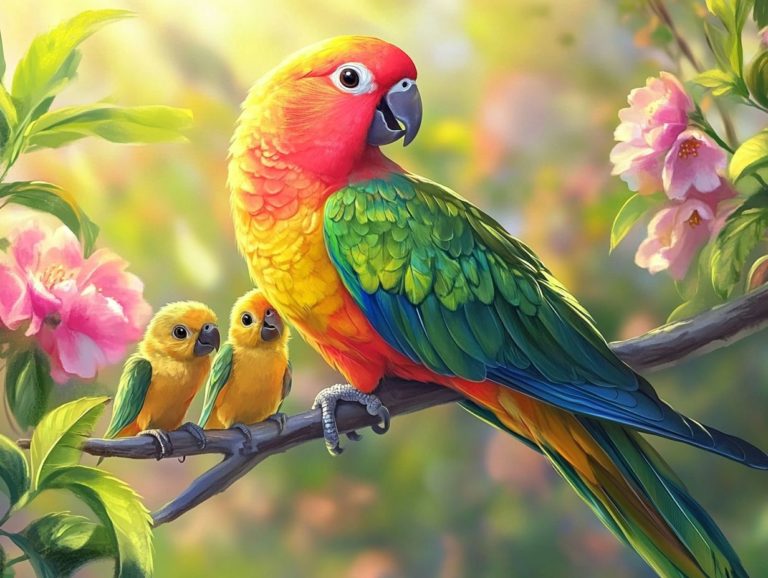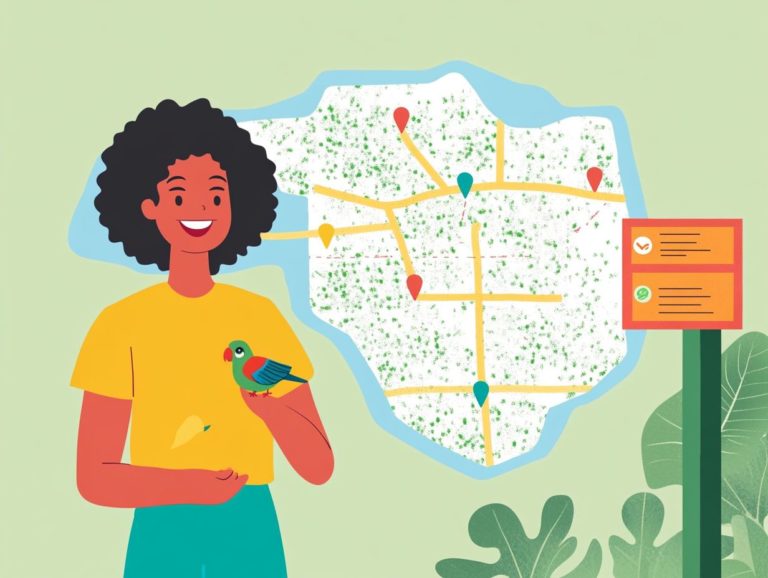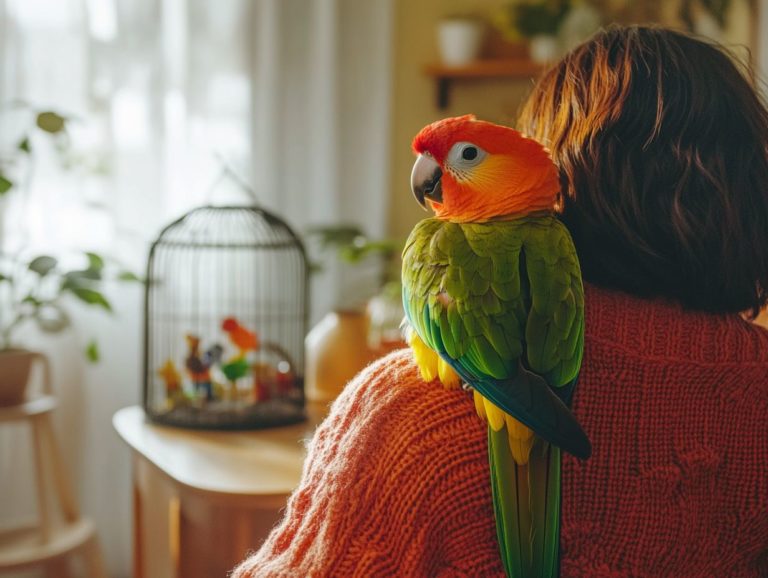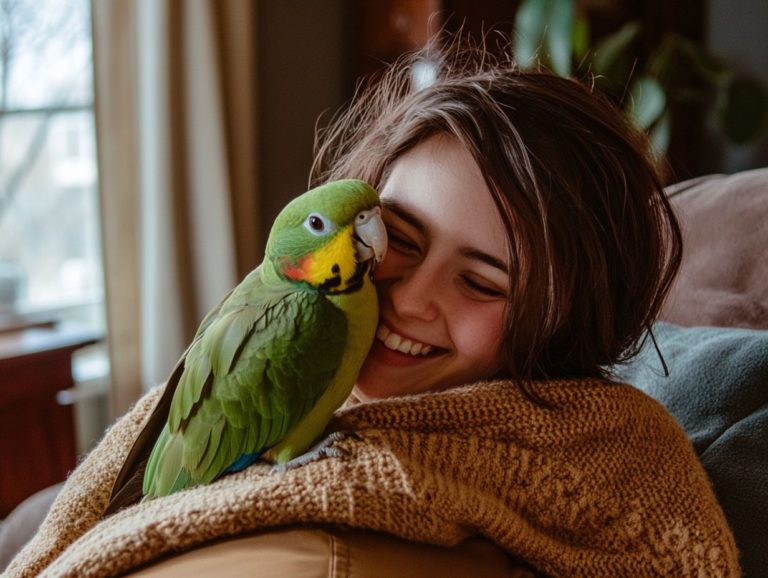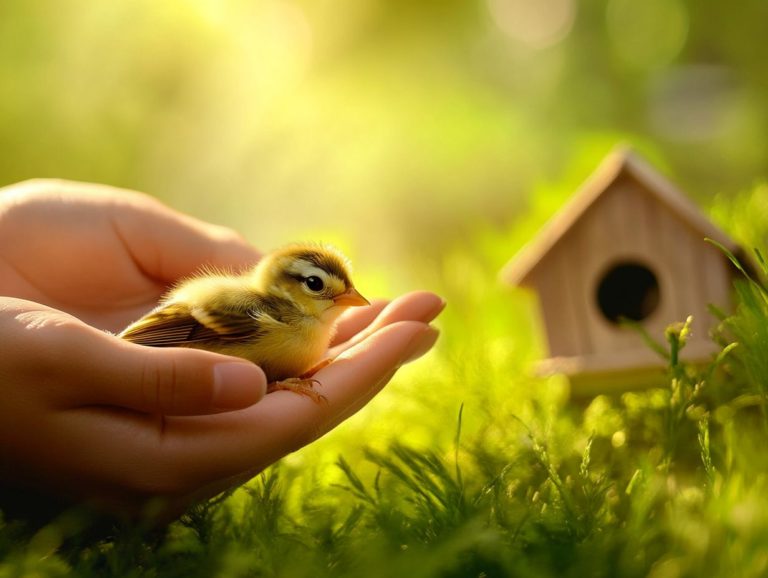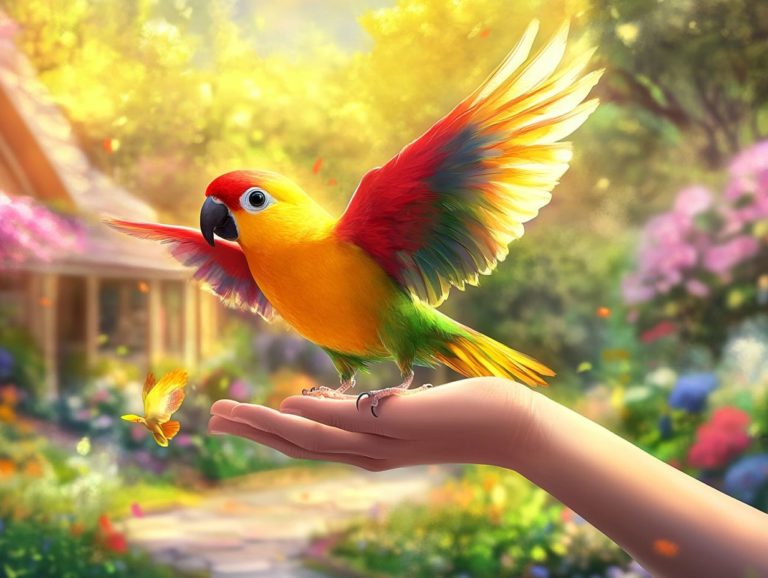5 Ways to Make Your Adopted Bird Feel at Home
Bringing a new bird into your home can be an immensely rewarding experience, yet it also presents unique challenges that you ll need to navigate.
This article outlines five essential strategies to ensure your new bird can get used to their new home comfortably and securely. From crafting a safe living space to establishing a daily routine and providing ample mental stimulation, you ll find everything you need for a seamless transition.
This article also addresses common concerns about integrating your bird with other pets and offers valuable bonding tips. Get ready to create a joyful and welcoming space for your new bird friend!
Contents
- Key Takeaways:
- 1. Set Up a Comfortable Bird Habitat
- 2. Establish a Routine
- 3. Offer a Variety of Quality Food Options
- 4. Spend Quality Time with Your Feathered Friend
- 5. Provide Mental Stimulation and Enrichment
- How to Introduce Your Bird to Other Pets in the Household?
- What Are Some Common Challenges When Adopting a Bird?
- Frequently Asked Questions
- What are the Best Ways to Make My Adopted Bird Feel at Home?
- Making Your Bird Feel Safe and Secure
- Helping Your Adopted Bird Feel Comfortable with You
- What to Do If My Adopted Bird Seems Stressed or Anxious
- Is Socialization Important for My Adopted Bird?
- Signs That My Adopted Bird is Happy and Comfortable
Key Takeaways:
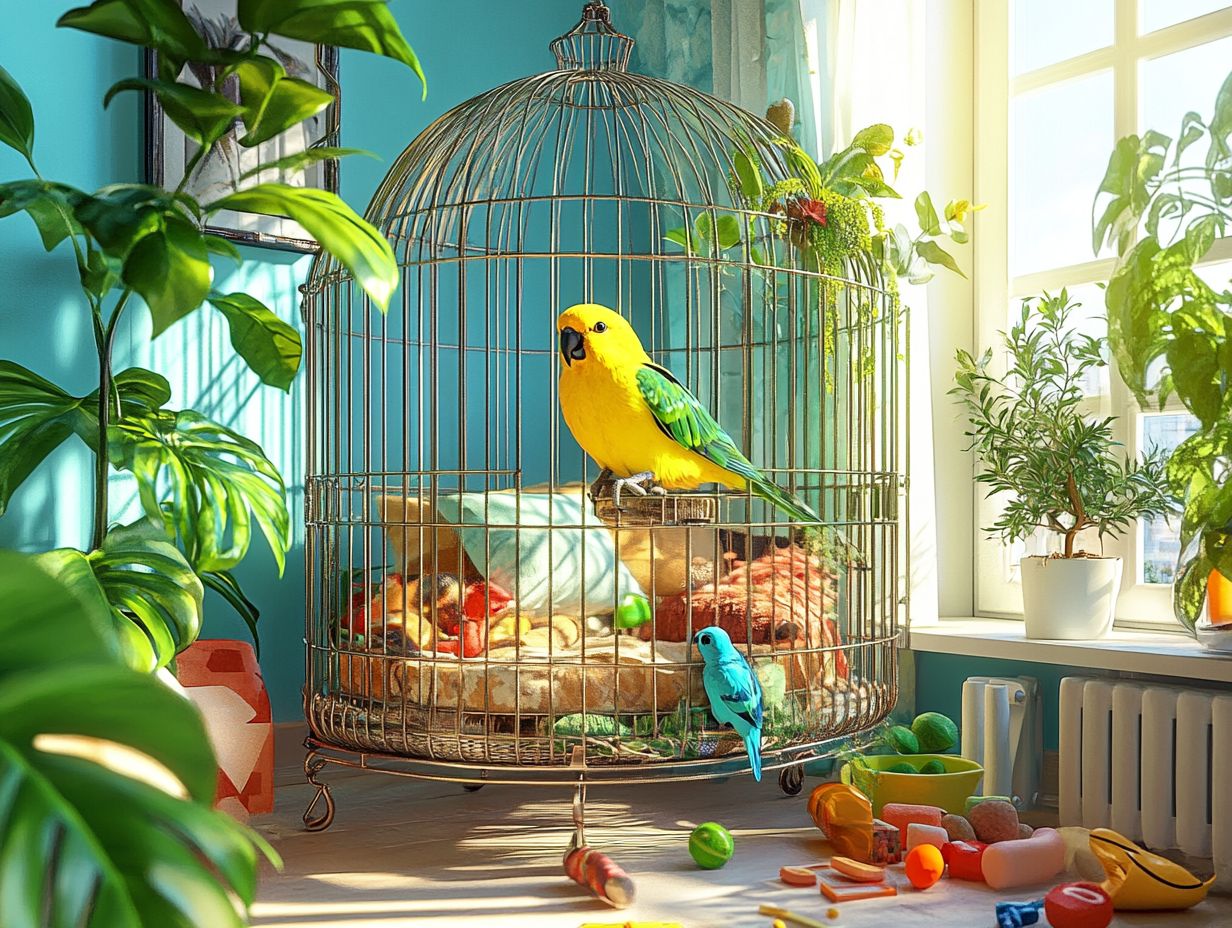
- Create a comfortable space for your adopted bird to help them feel secure and at home
- Establish a routine for feeding, playtime, and interaction to help your bird feel more settled and secure
- Offer a diverse and nutritious diet to keep your bird healthy and happy
1. Set Up a Comfortable Bird Habitat
Creating a comfortable and safe living space for your new bird is essential for their happiness. For tips on creating a bird-friendly environment after adoption, it allows your bird to thrive in an environment tailored to their needs and preferences.
This means choosing the right bird cage, keeping it clean, and equipping it with essential accessories, such as bird toys that promote your bird’s health and well-being.
Selecting the appropriate size cage is fundamental; it should provide enough room for movement and play while accommodating perches, toys, and food dishes. Cleanliness plays a vital role as well, helping to prevent health issues and ensuring a clean cage for your bird.
Birds, especially those that are social, flourish in settings that cater to their behavioral needs, encouraging interaction and mental stimulation. Establishing regular health checks, which are assessments to ensure your bird is healthy, will give you peace of mind and contribute to a happier, more vibrant pet.
This nurturing bond enriches both your life and your bird’s, creating a harmonious living experience.
2. Establish a Routine
Establishing a daily routine is vital for your bird s well-being. It helps regulate their sleep patterns and promotes healthy activity levels, ensuring they feel secure and content in their environment.
By incorporating structured feeding schedules and designated playtime, you create a sense of stability that allows your bird to know exactly what to expect throughout the day.
Understanding their behavior will lead to a smoother adjustment to life in captivity, ultimately fostering trust between you and your bird.
This trust is essential, as it encourages more interactive and positive behaviors, transforming your bird into a happier, more social pet. Establishing a regular nap time ensures they are well-rested, reducing stress and anxiety, and further enhancing their quality of life.
3. Offer a Variety of Quality Food Options
Providing a variety of quality food options is essential for your bird’s diet. It not only fulfills their nutritional needs but also caters to their preferences, fostering overall health and happiness.
Starting with high-quality pellets is an excellent foundation, but don t stop there. Incorporating an array of fresh fruits and vegetables can significantly enhance their meals.
For example, leafy greens like kale and crisp bell peppers offer vital vitamins, while fruits such as bananas and berries can bring joy to their food preferences.
Understanding your bird s favorite foods will enrich their feeding experience, allowing you to customize their diet with more of what they love. This approach not only ensures proper nutrition but also keeps mealtime exciting and engaging, deepening the bond between you and your bird.
4. Spend Quality Time with Your Feathered Friend
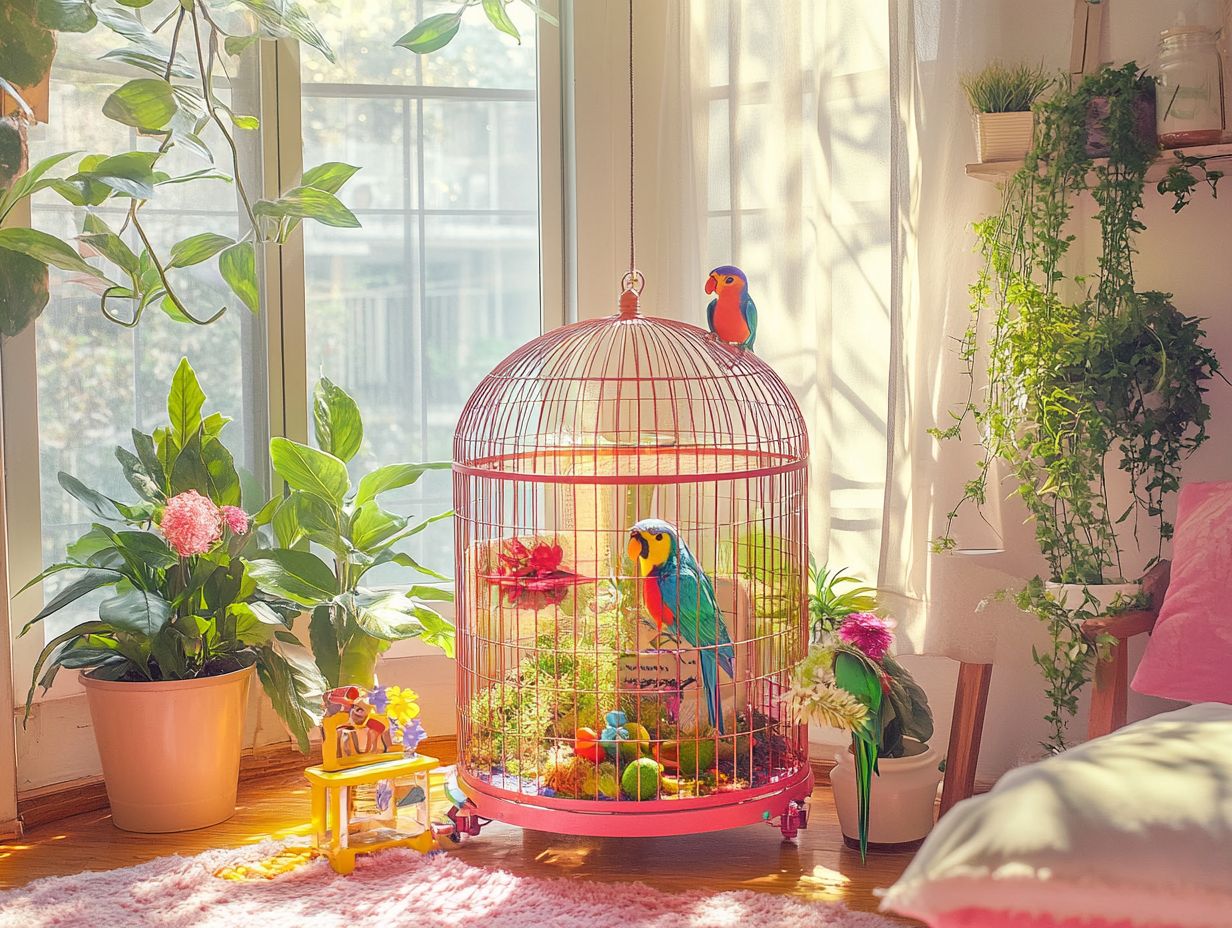
Spending quality time with your bird is vital for nurturing a personal bond and enhancing their social nature. As social species, birds thrive on interaction and companionship, creating a positive environment that fosters growth.
Engaging in gentle handling techniques can significantly elevate your relationship. These actions instill a sense of security in your bird while fostering familiarity. Speaking softly to your pet helps them recognize your voice and understand their surroundings. This further deepens your connection.
Incorporating toys for birds into your routine is another effective strategy. These toys not only provide entertainment but also stimulate mental engagement. Foraging toys, which let birds search for food like they would in the wild, can enhance their playtime. By observing how your bird interacts with these toys, you can gain valuable insights into their preferences and moods, ultimately leading to improved communication and a stronger trust bond.
5. Provide Mental Stimulation and Enrichment
Keep your bird entertained and happy with exciting toys and activities! Providing mental stimulation and enrichment is essential for preventing boredom and ensuring your bird remains engaged and happy in their environment.
Incorporate activities like interactive puzzles, foraging toys, and even a simple bird bath. These can significantly enhance your bird’s quality of life. For instance, puzzles that challenge your bird s problem-solving skills keep their mind sharp. Foraging toys mimic natural behaviors, encouraging exploration and creativity in their bird habitat.
Engage in playtime where your bird searches for hidden treats. This not only stimulates their mind but also strengthens the personal bonding between you both. This interactive play opens the door to training opportunities, making it easier for you to teach commands or tricks. Ultimately, this results in a more content and well-rounded companion.
How to Introduce Your Bird to Other Pets in the Household?
Introducing your new bird to the other pets in your household demands a gentle handling approach to cultivate a harmonious atmosphere. Slow introductions and building trust are essential for successful social interactions across species.
Understand how your bird and other pets behave. This knowledge helps you navigate this transition smoothly. Begin by creating a safe space for the bird, away from the hustle and bustle of other animals, ensuring it feels secure in its new environment. For additional tips, check out how to help your bird adjust to change.
Gradually allow your pets to observe from a distance to keep stress levels low. Close supervision during those initial interactions is vital; it allows you to spot any signs of discomfort or aggression. Watch for behaviors such as fluffed feathers, bird sounds, or attempts to escape these can all signal stress.
By taking measured steps and exercising patience, you can help your pets adjust to their new feathered friend, paving the way for a peaceful coexistence over time.
What Are Some Common Challenges When Adopting a Bird?
When you decide to adopt a bird, you might encounter several common challenges, such as deciphering bird behavior and recognizing the unique personality traits of various bird species. Learning how to integrate a bird into your home can help make this transition smoother.
Navigating these hurdles requires a thoughtful blend of research, patience, and an open mind. Adjusting to a new environment can be particularly tricky, as many birds may initially exhibit stress-related behaviors or show reluctance to explore their surroundings. To ease this transition, consider learning more about how to help your bird adjust to a new home.
Health considerations are equally critical. Ensure your new feathered friend is free from illnesses and parasites before bringing it home. Establish a routine for health checks. Take the time to familiarize yourself with the specific needs and temperaments of your chosen species, such as budgie, cockatoo, or African gray.
Consult with avian veterinarians and engage with online forums or local bird clubs for valuable advice, support, and resources regarding bird care. This can lay the groundwork for a harmonious relationship with your new companion.
Don t wait start building a bond with your bird today!
What Are Some Tips for Bonding with Your Adopted Bird?
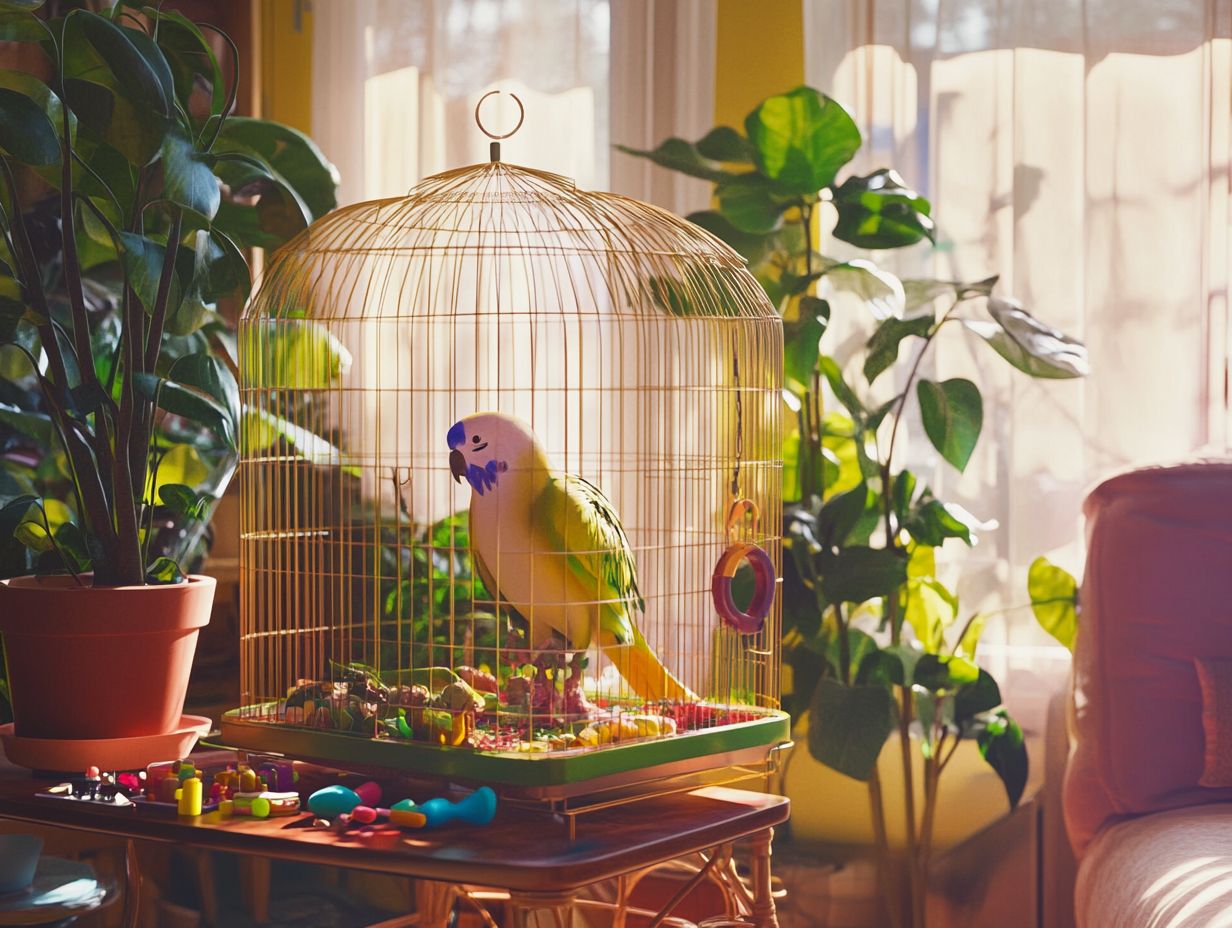
Establishing a strong bond with your adopted bird is essential for building trust and ensuring lasting companionship. To achieve this, follow tips on creating a safe space for your adopted bird through gentle handling and meaningful social interactions.
To facilitate this connection, regular interaction is key. Spending time together each day helps your bird feel more comfortable and secure. Offering treats as rewards can create positive associations, further reinforcing your bond.
It’s also vital to understand the nuances of bird communication. Recognizing their body language and bird sounds will provide you with valuable insights into their mood and comfort level.
Patience is crucial in this journey. Each bird has its own pace, and respecting that during the adjustment phase will help nurture a trusting relationship that flourishes naturally.
How Can You Tell If Your Bird Is Happy and Comfortable in Their New Home?
Determining whether your bird is happy and comfortable in its new home involves keen observation of both its behavior and environment. Signs of contentment often manifest in their bird’s activity levels and social interactions.
A happy bird typically engages in playful behaviors, such as flapping its wings, swinging on toys, or exploring its surroundings with an air of curiosity. Vocalizations ranging from cheerful chirps to melodious songs serve as powerful indicators of a bird’s joyful state.
When your bird interacts positively with you or other feathered friends, showcasing trust and friendliness, it reflects their overall satisfaction.
To encourage these delightful behaviors, creating an enriching environment is essential. This means providing a diverse selection of toys, ample opportunities for socialization, and safe spaces for exploration. Each element plays a significant role in enhancing your bird’s overall happiness.
What Are Some Common Mistakes to Avoid When Adopting a Bird?
Common mistakes made by new bird owners when adopting can profoundly affect the well-being of their feathered companions. To avoid these issues, it’s essential to understand how to prepare for bird adoption day, as neglecting health checks and overlooking specific needs and preferences can lead to unforeseen challenges.
These oversights often arise from a lack of understanding regarding the appropriate habitat setup, which is vital for a bird’s mental and physical health. An inadequate cage size, unsuitable perches, and a dearth of stimulating toys can create stress and result in behavioral issues.
Poor dietary choices can severely impact a bird’s health. Failing to provide a variety of seeds, fresh fruits, and vegetables can lead to health problems. Many new owners also underestimate the significance of spending time with their bird, which is crucial for a bird’s happiness.
To sidestep these pitfalls, take the time to learn about bird care through credible resources and seek guidance from seasoned bird enthusiasts. This commitment will not only enrich your experience but also ensure a thriving environment for your new avian friend.
What Are Some Resources for Learning More about Caring for an Adopted Bird?
Countless resources await you as a new bird owner, ready to elevate your understanding of bird care. These insights delve into everything from bird behavior to training techniques and the nuances of responsible pet ownership.
Reputable sources, such as the American Birding Association and Avian Avenue, offer forums where you can connect with fellow enthusiasts who can share valuable experiences and advice. Organizations like the Association of Avian Veterinarians provide resource guides crucial for ensuring proper health care.
By leveraging these tools, you not only deepen your understanding of your bird s specific needs but also significantly enhance the overall well-being and happiness of your adopted feathered companion.
Frequently Asked Questions
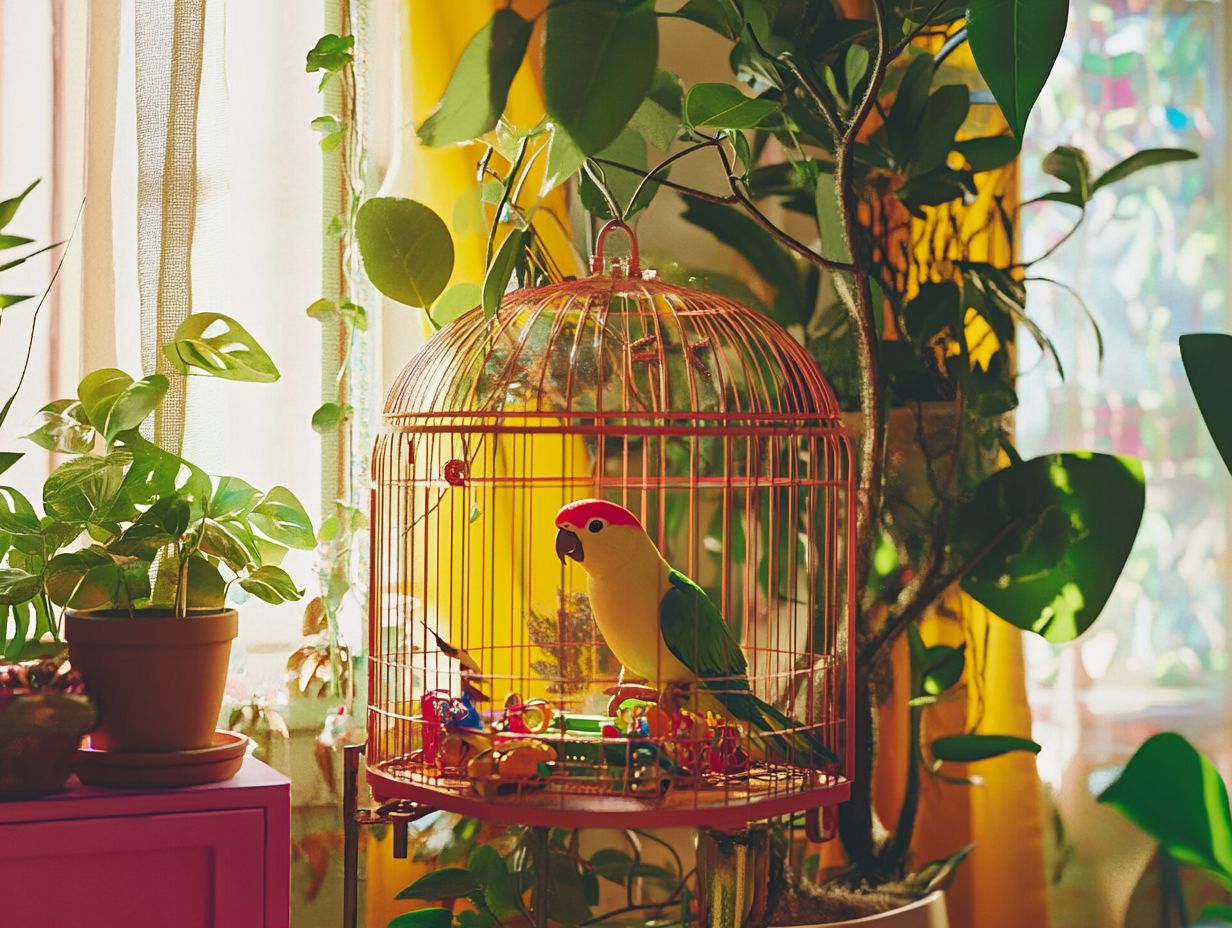
What are the Best Ways to Make My Adopted Bird Feel at Home?
Create a comfortable and safe living space for your bird, including a cozy birdcage with plenty of room to move around.
Provide a variety of toys and perches to keep them entertained and stimulated.
Spend time with your bird every day to establish a bond and show them love and attention.
Offer a diverse and nutritious diet, including fresh fruits and vegetables, to keep your bird healthy and happy.
Introduce your bird to their new environment gradually and calmly to help them adjust.
Making Your Bird Feel Safe and Secure
Place their cage in a quiet area of your home, away from loud noises or disturbances.
Use natural materials like branches and ropes to create a sense of security and mimic their natural habitat.
Avoid sudden movements or loud noises around your bird, as this can startle and stress them.
Be patient and understanding as your bird adjusts to their new home, providing reassurance through your body language and tone of voice. For tips on building that connection, check out how to bond with your newly adopted bird.
Helping Your Adopted Bird Feel Comfortable with You
Spend quality time with your bird every day, talking to them and engaging in activities together.
Offer treats and rewards to build trust and positive associations with you.
Avoid forcing interactions or handling your bird if they are not yet comfortable. Let them approach you on their own terms.
Be consistent in your interactions and routines to help them feel secure and familiar with you.
What to Do If My Adopted Bird Seems Stressed or Anxious
Pay attention to your bird’s body language and vocalizations, as these can indicate when they are feeling stressed.
Ensure their living space is clean, well-ventilated, and free of potential hazards.
Offer a variety of toys and activities to keep them mentally and physically stimulated.
If your bird’s stress levels do not improve or if you have concerns about their well-being, consult with a veterinarian or bird behaviorist.
Is Socialization Important for My Adopted Bird?
Yes! Socialization is crucial for the mental and emotional well-being of birds.
If your bird is used to being around other birds, consider getting them a companion to keep them company.
If you are their only source of interaction, spend enough time with your bird and provide opportunities for socialization through play and training.
Avoid prolonged isolation, as this can lead to behavioral issues and loneliness.
Signs That My Adopted Bird is Happy and Comfortable
Your bird will vocalize and interact with you positively, such as singing, chirping, and playing.
They will be active and engaged in their environment, exploring and playing with toys.
Your bird’s feathers will be healthy and well-groomed, and they will have a good appetite.
You will establish a bond and trust with your bird, and they will seek out your attention and affection.
Don’t wait share your experiences with your adopted birds and foster our community engagement!

